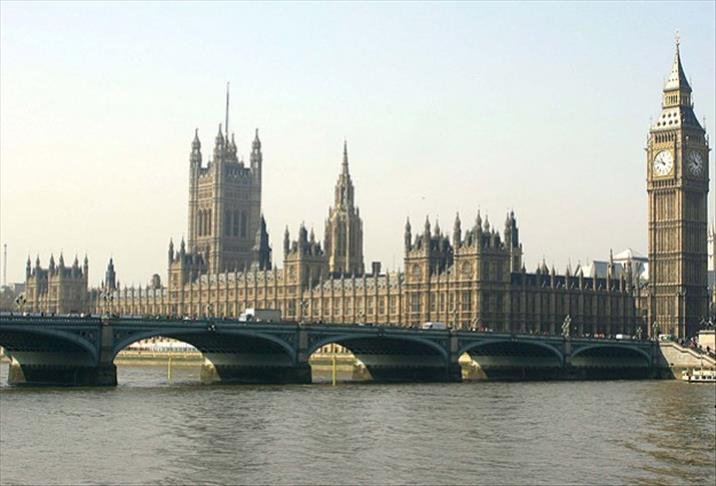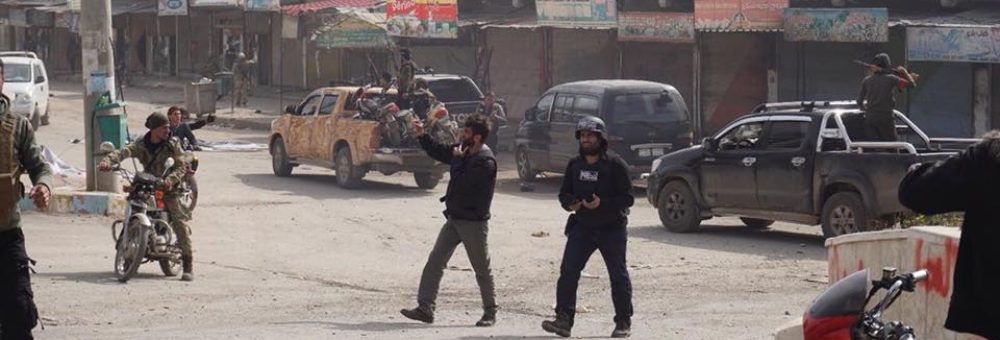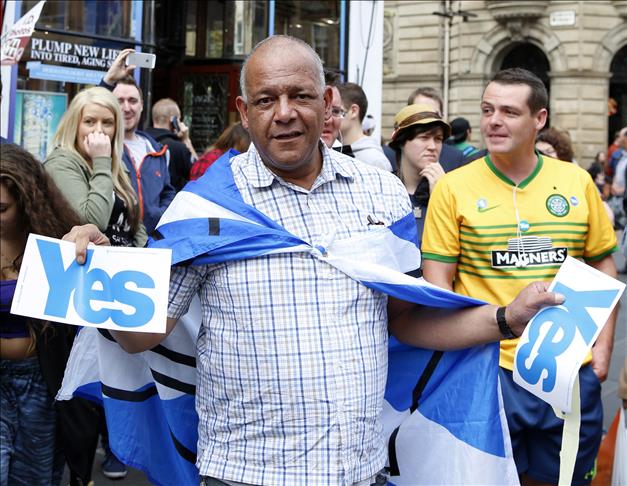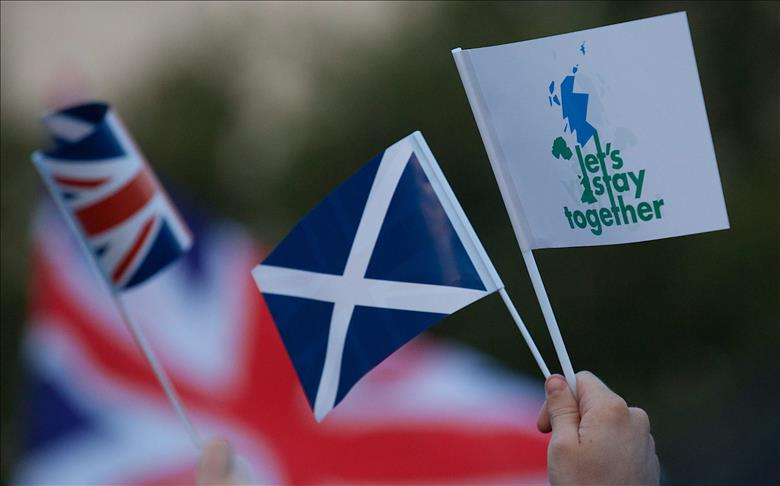‘The question is, did ’you‘ ever see a wrong and try to change it,’ says UK man on returning home, having fought Assad.
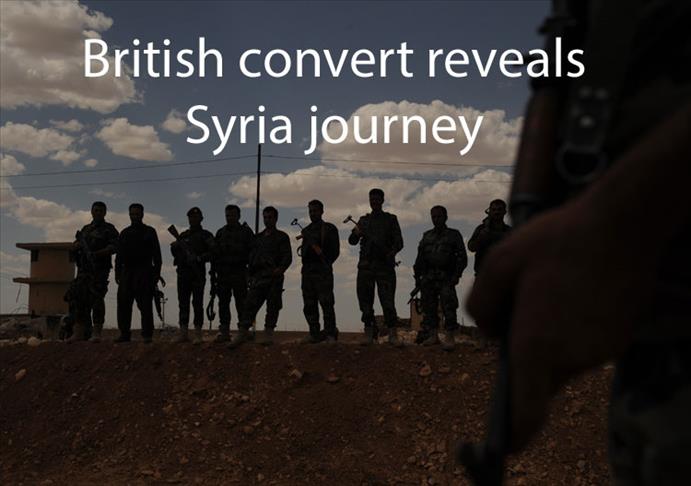
He ignored the warnings, took the risks, and hopped on a plane. Hours later – via Heathrow, Istanbul, and then over land to the border – he arrived in Syria.
A Muslim convert, born and bred in the UK, he was determined to join the fight against Bashar al-Assad.
“Syria is clear cut… People were getting slaughtered on a mass scale,” he told the Anadolu Agency from a London suburb.
He didn’t appear nervous. He was methodical and calm. He frequently paused mid-sentence to think about his answers, tilting his head to one side, his eyes glancing upwards as he contemplated the weight of his words.
“I went over to stop the slaughter.”
He’d agreed to meet and talk to AA on condition of anonymity. Anonymity? Do I really have to explain why?
For years, the British government has been trying to prevent such “homegrown terrorists.” Through its Preventing Violent Extremism program it has attempted to dissuade those it deems at risk from radicalization from traveling overseas and taking part in jihad (holy war). In its latest approach, Prime Minister David Cameron is reengineering this focus to concentrate on not just stopping wannabe fighters from traveling overseas – to Iraq, Syria, Libya, Somalia… – but also stepping up plans to remove their citizenship and stop them from returning to the U.K. Further strengthening the government’s determination are recent Islamic State videos that appear to show a still unidentified man with what appears to be a British accent beheading two U.S. journalists.
In the London home, the man picked up two chairs from the kitchen and placed them in the garden. He then took our mobile phones – his included – turned them off, and placed them on a wooden stand out of earshot, explaining that he – and others – had to be extra cautious now due to the change in British policy.
As he talked, his voice sometimes dropped to a whisper as if to ensure no one could hear. I looked around expecting to see someone, perhaps just a giveaway flicker of movement at a fence or as a neighbor went indoors. There was no one there.
Sometimes he talked about his journey in the first person, others in the third. One time he talked about “the brother he knew,” and it was only a few minutes later that I realized he was talking about himself. It was almost as if every word, every sentence, was carefully orchestrated so he could tell any court of law that he was talking about somebody else.
And so the journey began.
There’s two ways of getting to Syria, he said. “Pre-planned and freestyle.”
“I went to one place [in transit], and I stuck out like a sore thumb because there are no tourists there. People will approach you and ask you what you are there for.“
He makes his hand into a pistol, wiggling his thumb as if he’s cocking the hammer.
“You don’t have to say that you’ve come to do that,” he says. ”You say that you’ve come to help the brothers.”
He said that he’d heard that al-Assad had people working on Syria’s borders trying to funnel “would be helpers” to their side.
Once in Syria, they “slaughter them,” he added. “It’s from Allah if you make it across or not. There’s wrong been done and people want to stop it.”
In the border towns you wait, he says people cross backwards and forwards all the time. They come for “supplies,” and when they go back you go in with them.
In Syria, “contacts” took him to the rebel-held side of Aleppo where he was given an AK-47 – “I already knew how to use it” – and he joined the fight.
“You see before you a reflection of life – two extremes… You see the normality, because life must continue, and on the other hand you see the destruction that war causes. In any war zone it is the infrastructure – the roads and the buildings – that get hit.”
“You go past a school, you don’t see graffiti on the wall as you may do here in London, but you see bullet holes. People are living on a day-to-day basis.”
He tells AA how the Syrians reacted to him being in their country, because he was obviously a foreigner.
“Some people look at you and it’s like they’re looking at a dead man walking, it’s almost as if they’re saying ‘Why would you want to be here?’ But there are those that are obviously grateful that you have come to fight.”
He explains that in Syria foreigners are grouped depending on their ability, their experience, if they’ve been through “training” and if they know “the tools of the trade.”
“Whether you go to the front line is down to two things… whether they [the rebel group] think you are ready, or you think you are ready.”
Sometimes you don’t even see much action – “it all depends on what group you are with.” You can easily get shot at everyday. But if your idea of action is “operations, then it all depends on what is planned.”
He highlighted the difficulties with communication; most western fighters not knowing the local Arabic tongue.
“You need to relay orders and information to these guys and that needs to be done through a translator,” he says. “In the heat of battle, this can be an issue, so they need competent people.”
He’s tall, toned, and of an athletic build. When he looks you in the eye, his gaze is intense, his eyes clear. He obviously physically looks after himself, but for him there’s more to it.
“You see things clearly [out there],” he says. “You could spend hours praying. You’re freeing yourself from the world. You feel like something is calling you. It’s like waves upon waves of pleasure in everything you do. It’s like a very spiritual thing… you are spiritually high.”
And then – as I steal away from his gaze to consult my notes – a switch is flicked, his calm demeanor suddenly replaced by agitation and what appears to be confusion as I ask him what he thinks of the Islamic State.
“Nah,” he says, shaking his head. “I’m not part of them. I’ve never fought for them. But even if you believe the allegations… How about the people they [the West] kill around the world, the children that starve? How about them? How about the children that we don’t see on TV?”
And then a pause. He’s thinking again.
“Everyone can. Every organization has people that can make mistakes – that does not mean that the organization is bad.”
He veers off into an attack on the “capitalist system,” says that “people die everyday because of the exploitation and oppression.”
His hands are now moving fast, palms towards him, revolving between his knees in a controlled orbit, as if toying with a rubber band.
“What’s wrong with them [the Islamic State] if they have come to eradicate that? If you molest children, then you get a slap on the wrist, but if you dare defend people that are been massacred in Syria then they [the politicians] throw the book at you.”
“These guys, the government, they lie; trying all they can to hold onto power.British interests? – Just tell me the truth, don’t insult my intelligence. Then they try to shut you up, views that do not agree with the government, they try to shut you up,” he exclaims.
“An adult can make his own mind up. If you tell someone not to do something, they’ll do it. If you tell someone not to say something, they’ll say it… The government is its own worst enemy.”
He says he’s uncertain if he’ll go back, and attests to the chaos that has descended on Syria since he was there – just ”last year.”
“There are [now] groups that are fighting each other… [along with] groups that are fighting IS and Bashar. If you’re there just to fight Bashar then it’s difficult, as you have to find and join a group that is just doing that and not fighting another group at the same time.”
And then he’s back to Britain.
“Whatever you do [now], when you go out there, you’re going to get tarred with the same brush [by the government]. Whether you went to help people or whether you went to help IS. It’s the same thing to them. Those that went to Bosnia didn’t come back and commit terrorism. And there were lots of us that went to Bosnia. We were no threat to the UK. I don’t get how those that went to Syria first were not [considered] a threat and now they are.”
He’s not giving me an answer. I ask him if he will go back?
He clasps his hands and leans back in his wooden chair. It’s a good 30 seconds before he answers.
“If I go back, I’m not coming back [to the UK],” he says.
“If you come back you will be humiliated, put in jail and humiliated. That ain’t happening. I’m not naive and think that I’m going to change the world – You may get out there and change nothing.”
And then he puts me in my place, me sitting here with my comfortable life, judging him for his honesty and actions.
“The question is, did ‘you‘ ever see a wrong and try to change it?”
Read the original article published in Anadolu Agency on 13 September 2014
